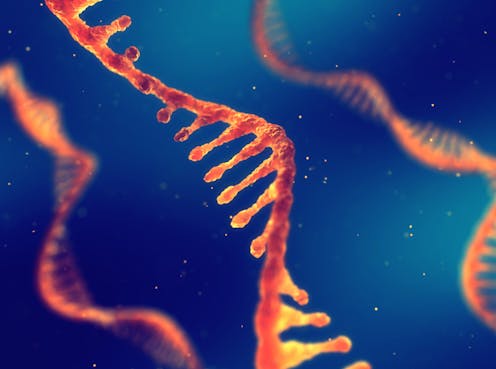Yes, the coronavirus mutates. But that shouldn't affect the current crop of vaccines
- Written by Rebecca Rockett, Virologist, University of Sydney

“Coronavirus” has already established itself as the scary new word of 2020. Add the word “mutant”, and you’ve got an even stronger candidate for the scary new phrase of 2021.
One fear is that critical parts of the coronavirus genome will mutate, making any vaccine obsolete before it’s widely rolled out next year.
But how much of an issue is this really? As we’ll see, SARS-CoV-2, the coronavirus that causes COVID-19, mutates, as do all viruses. But unlike other RNA viruses, it’s actually quite stable.
That’s largely good news for the first crop of vaccines that are set to be rolled out around the world in 2021.
What’s a mutation anyway?
In genetic terms, a mutation is just a scary word for a mistake. As cells make new copies of a virus, mistakes happen. These mistakes sometimes result in a stronger virus, sometimes a weaker virus.
But in most cases mutations in the coronavirus are irrelevant anomalies that cause changes to the genetic material (RNA) but not the resulting proteins that make up its composition and structure.
In fact, SARS-CoV-2 seems to have a slower rate of mutation than other RNA viruses. That’s because it belongs to a family of viruses with genetic proofreading mechanisms that can identify and remove most mistakes in its RNA when the virus replicates.
This means SARS-CoV-2 has about half the mutation rate of influenza and a quarter the mutation rate of HIV.
Read more: Mutating coronavirus: what it means for all of us
What about mutations and spike proteins?
If there are lots of mutations in non-essential regions of a virus’ genetic material, it can likely still function. But mutations in critical regions can disable a virus, so these don’t occur very often.
This is why vaccines are typically designed against these critical regions — to safeguard against mutations that would make them ineffective.
And it’s mutations in one of these critical regions, the COVID-19 spike protein, that has gained significant attention recently.
This is the protein many COVID-19 vaccines use to generate a protective immune response. In fact, the four vaccines Australia has signed agreements for, should they pass clinical trials, all either contain the virus’ spike protein or carry the instructions your body needs to make it.
What’s all this to do with mink?
One mutation that has attracted controversy is the D614G mutation, partly because it leads to a spike protein with a slightly altered shape.
And some scientists were concerned this mutation, plus three others in the spike protein, would help the virus bypass the type of immunity generated following vaccination.
These mutations emerged when the coronavirus jumped from humans to minks and back again.
To avoid the potentially disastrous implications of this new combination of variants rapidly spreading in humans, millions of minks were culled in Denmark, Spain and the Netherlands.
However, not all scientists are convinced of the potential impact of this combination of mutations. So studies are currently under way to better understand their impact.
Read more: Denmark to cull mink herd over coronavirus mutation fears – here's what the science says
Syringes at ten paces
Considering what we know about how the virus mutates and the rate of these mutations, the first generation of COVID-19 vaccines look likely to provide some protection against currently circulating SARS-CoV-2 strains.
However, researchers are monitoring the possible emergence of any new mutations in the spike protein from isolates around the world to ensure ongoing vaccine effectiveness.
We can identify any mutations using a technique called genome sequencing, which allows scientists to read the complete genetic sequence, or genome, of the virus.
Since January, scientists around the world have generated and made publicly available more than 246,000 COVID-19 genomes. Scientists can then compare these with the early COVID-19 genomes sequenced in Wuhan. These early sequences are the templates for the vaccines we are waiting impatiently for.
This surveillance will provide an early warning system for potentially critical mutations. And if researchers find mutations, they need to work out what these mutations actually do, using so-called “functional tests”.
Such tests can tell us whether a new mutation influences our immune response to the spike protein, compared to those induced by the original Wuhan strain. We can also investigate if antibodies following vaccination can continue to bind to the spike protein of emerging strains and prevent the virus from infecting human cells.
So should we be worried?
Researchers have only been able to study this coronavirus for a very short time. So only time will tell if it mutates at a frequency and at limited positions in the essential regions, as we have come to expect. That’s why surveillance is so important.
The current crop of vaccines have been developed using decades of accumulated scientific knowledge and are based on what we know about mutations in this and other coronaviruses. So we shouldn’t be too worried when we read scary headlines about a “mutant coronavirus”.
This past year has demonstrated the capacity to rapidly produce vaccines, which hopefully can be modified to reflect new mutations and merging strains should they occur.
Authors: Rebecca Rockett, Virologist, University of Sydney





